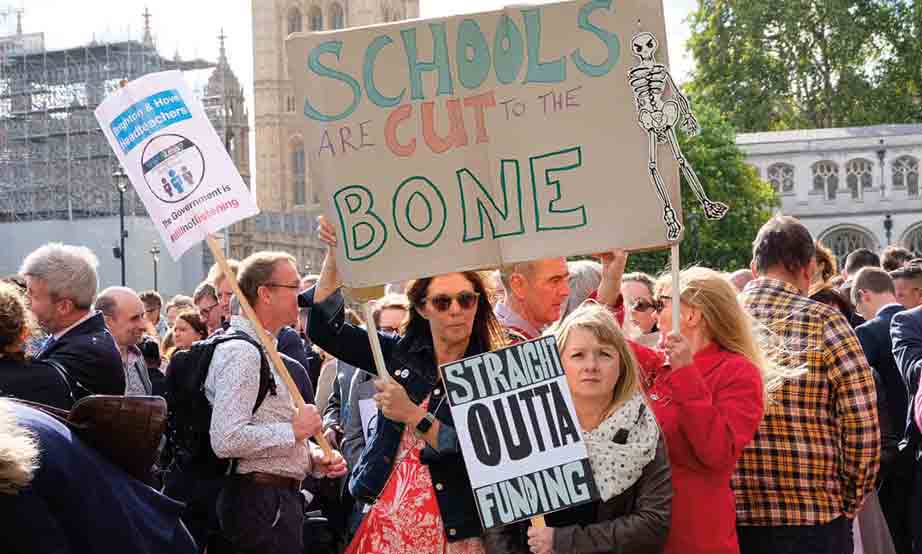
After a decade of systematic cuts, Britain’s state education system is crumbling; as of August this year Tes* and National Governance Association research found 4.2% of secondary schools have had to cut opening hours, 32% have cut teaching staff and over half (52%) have cut support staff. The survey confirmed poorer students and those with special educational needs and disabilities (SEND) are the worst affected, as 60.5% of schools do not have sufficient funds ‘to support the needs of pupils from disadvantaged backgrounds’, and 78% are not funded to meet SEND requirements, while the number of schools having to provide food banks and wash their students’ uniforms is rising. With a possible general election in the pipeline for October, the Tories have made a great fanfare of their plans to ‘level up’ funding by £7.1bn by 2022-23. But their sums do not add up; school leaders and the National Education Union have pointed out that this is woefully short of the amount needed to reverse the damage done to schools, which is estimated at £12.6bn by 2022-23. Ruby Most reports.
A new decade of more austerity
On 4 September Chancellor and former managing director at Deutsche Bank, Sajid Javid, ludicrously claimed in his spending round speech that the upcoming year’s spending plans are ‘turning the page on austerity and beginning a new decade of renewal’. A week before Javid’s speech, Johnson boasted that the increase to school spending would be a ‘giant £14bn’, but this does not account for inflation, rising pupil numbers and sustained cuts. The funding is spread over three years and struggling schools will not see the first instalment of £2.6bn until 2020-21. The Institute for Fiscal Studies estimates that the cost of reversing the 8% of cuts to schools since 2009 would be £3.8bn in 2019-20 alone.
The touted increase is billions of pounds short of what is needed, and other claims in Javid’s speech do not stand up to scrutiny. The £700m for SEND spending in 2020-21, which Javid brags is ‘an 11% increase compared to last year’, falls far short of the deficit for high needs and SEND funding, which according to the Commons Education Select Committee is projected to exceed £1bn by 2021.
The pledge that each secondary school will be allocated at least £5,000 per pupil in 2020-21 (£3,750 per pupil for primary schools, rising to £4,000 in the following year) is a derisory £200 increase on the current minimum funding level of £4,800 per pupil, a minimum which is advisory and which most local authorities cannot afford to cover. A report published in September showed at least one fifth of councils have such a severe educational funding deficit that they were required to submit a recovery plan to the Education and Skills Funding Agency (Tes, 8 September 2019). Javid is well aware of this; his proposals are an insult to struggling schools and working class children being denied the right to an education.
A report published in August by the Education Policy Institute found that schools in disadvantaged communities would benefit the least from the funding, which will be funnelled to affluent areas and grammar schools; ‘the average non-disadvantaged pupil stands to gain £116 extra a year – more than double the £56 the average pupil eligible for FSM [free school meals] attracts’ (The Guardian, 2 August 2019). Javid’s promised ‘decade of renewal’ is nothing more than a calculated twisting of figures; attacks on public services will continue, and a movement to defend the state education system is vital to its survival.
More ‘reasonable force’, less support for vulnerable students
In an internal briefing document leaked to The Guardian on 27 August, more of the government’s plans for education were revealed. The measures included explicit support for head teachers using ‘reasonable force’ and exclusions to enforce ‘disciplined school environments’, a push to convert remaining local authority maintained schools to academies, and cutting more teaching assistants (TAs).
As we reported in FRFI 270, thousands of children have been permanently excluded due to a lack of funding for proper support and interventions, and children with SEND, those entitled to free school meals, black Caribbean and Gypsy, Roma and Traveller children are all disproportionately affected. The briefing document reportedly ‘acknowledges concerns’ that the proposed disciplinary measures ‘will impact disproportionately on children from some ethnic minority backgrounds, in particular black Caribbean boys, and those with special educational needs’ (The Guardian, 27 August 2019). This acknowledgement shows the ruling class’ disdain for vulnerable working class children who will be denied an education because of their money saving schemes.
‘Short-termism and initiative-itis’
In its inquiry into school funding published this July, the Commons Education Select Committee urged the Department for Education (DfE) commit to an ‘essential’ multi-billion pound funding increase with a ten-year plan for schools and colleges, arguing ‘the short-termism and initiative-itis that characterises the Department’s current approach cannot afford to continue’. One initiative which characterises the government’s perverse approach to education funding is the reported millions being spent ‘on “school resource management advisers” whose cost-saving suggestions included keeping money raised at charity events, cutting children’s food portions, and using spare staff to cover three simultaneous classes in a school dining hall’.
The committee’s recommendations have been ignored by the government, whose interest lies firmly with their ambitions to remain in power, to bamboozle voters with showy promises while continuing the decimation of public services. At a time when pupils and young people are leading the protest movement against climate change around the world, this government wants to beat them into line. The funding and planning necessary to provide a decent education for all children is not compatible with capitalism in crisis; until real resistance develops more and more working class children will be denied the right to be educated.
*Formerly the Times Educational Supplement.




